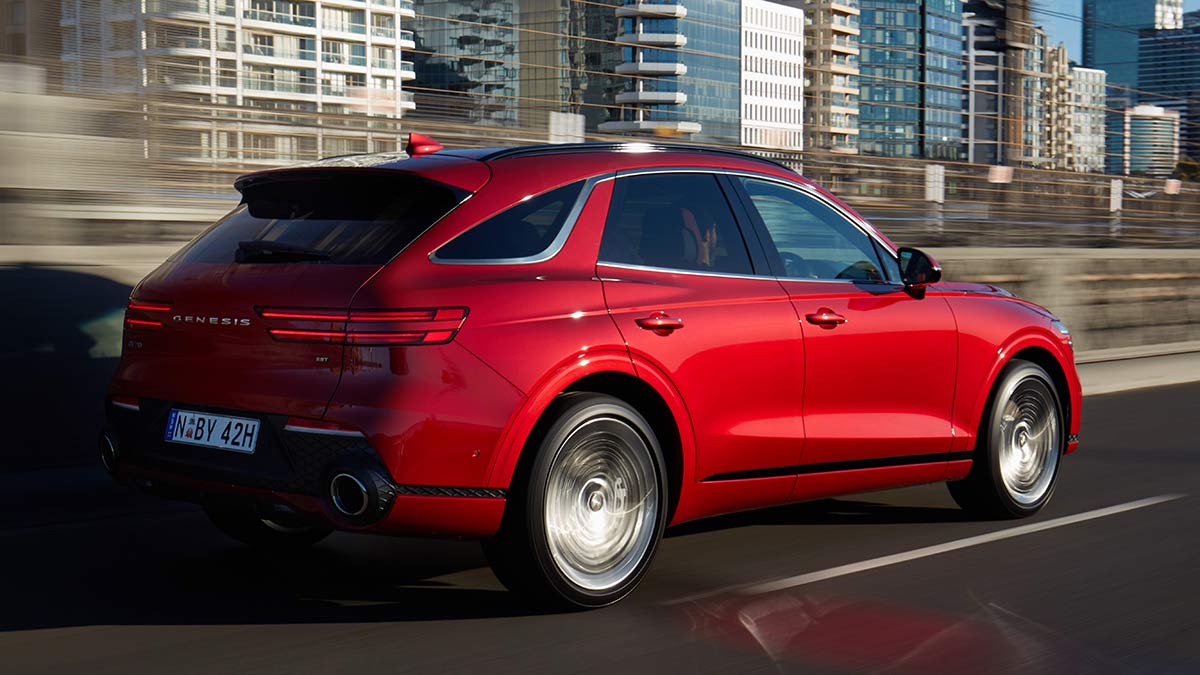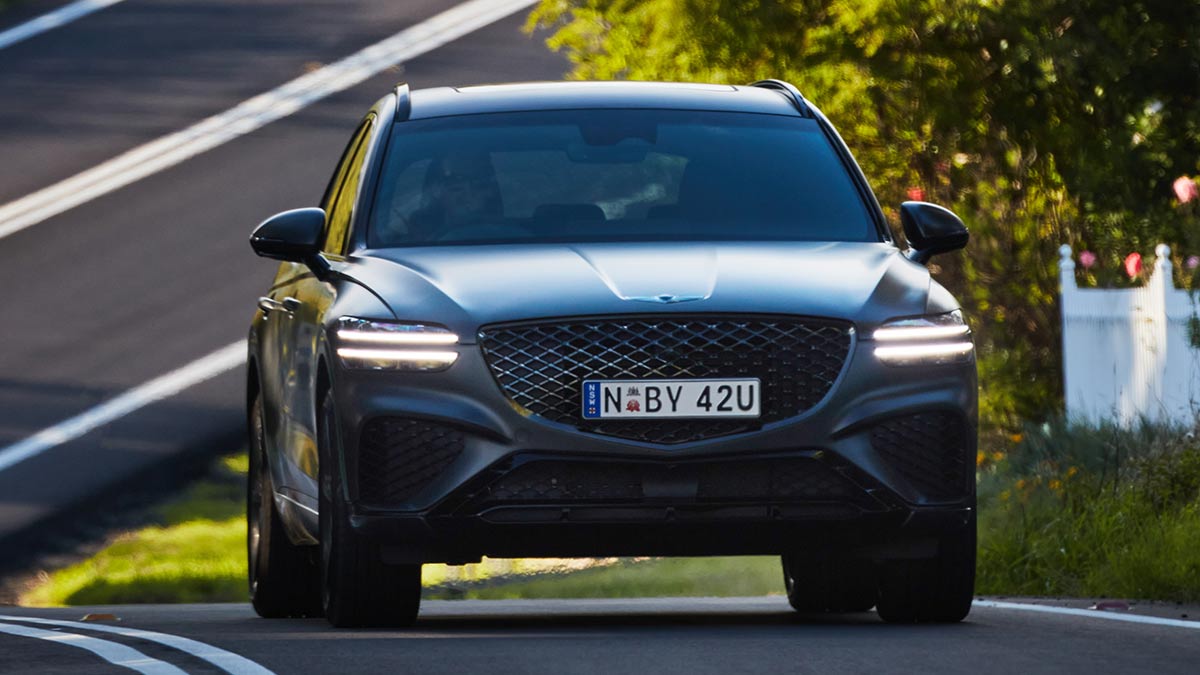The Xpeng G6 reads like a bona fide Tesla Model Y rival, but does that translate from the brochure to reality? Here we’re testing the more expensive G6 Long Range, which lives up to its name with a 570km claimed range.
Riding high: 2022 Genesis GV70 road test review

The Genesis GV70 mid-sized SUV is the company’s latest, and best chance to make an impression in the premium car segment, competing against the likes of Mercedes-Benz, BMW, and Audi.
Luxury car buyers are a typically a conservative group when it comes to car brands they’re prepared to consider.
The likes of Mercedes-Benz, BMW, Audi, Jaguar/Land Rover and Porsche tend to dominate this segment. While they all offer different products, the common denominator is they’re established marques with a proven reputation. Longevity equates to loyalty.
That makes the job of Genesis, the premium offshoot of Hyundai, an uphill battle.
Until now, they haven’t had the product to gain real traction in the Australian market.
The Genesis GV70 mid-sized SUV has the price, poise and appointments to leverage itself into buyers’ calculations. Time will tell if that is enough.
On this page
- How much does the Genesis GV70 cost?
- Is the Genesis GV70 safe?
- What's the Genesis GV70 like inside?
- What's under the Genesis GV70's bonnet?
- Is the Genesis GV70 efficient?
- How does the Genesis GV70 drive?
- Should I buy one?
How much does the Genesis GV70 cost?
Buyers have the choice of three engines with the Genesis GV70.
The entrée is the 2.5-litre four-cylinder turbocharged petrol engine at $66,400, plus on-road costs.
At that point you are buying a rear-wheel-drive model; the all-wheel-drive version adds another $2,400.
By way of comparison, the Audi Q5 starts from $68,350, an entry level BMW X3 costs $76,600 and the base Lexus NX350h is $65,600 plus on-road costs.
Those who regularly travel long kilometres should consider the Genesis GV70 AWD 2.2-litre four-cylinder turbodiesel with a starting price of $71,094.
Topping the line-up is the 3.5-litre V6 twin-turbo petrol engine, again in AWD. It tees off at $82,467.
Prospective owners of the 2.5-litre petrol and 2.2-litre diesel versions can choose to drop another $4,500 to buy a “Sports Line” pack that emulates the default look of the 3.5-litre variants.
The kit includes dark chrome highlights around the radiator grille, window frames and door handles, along with a revised front bumper, premium 19-inch wheels, leather and suede upholstery, alloy pedals, a sports steering wheel and upgraded brakes. Petrol versions also pick up a Sport+ drive mode.
The “Luxury” pack pushes the Genesis into European mid-sized SUV price territory, but for many, the added equipment may justify the investment.
This option adds full leather upholstery with heated outboard rear seats and a massage function for the driver and front passenger, a 16-speaker Harman sound system, three-zone climate control with controls for the rear occupants, head-up display, rear privacy glass, 21-inch alloy wheels, reverse parking collision avoidance and remote parking where the driver can exit the vehicle and use the key fob to park it.
That will cost $11,000 on the lesser engines and $6,600 on the 3.5-litre version.
Finally, owners of the 2.5-litre and 2.2-litre variants can combine both option packs at a cost of $13,000.
Matte paint adds $2,000 across the range.
Servicing intervals for the Genesis GV70 are 12 months/15,000km and the first five visits to the dealership are free.
Is the Genesis GV70 safe?
ANCAP has given the Genesis GV70 a five-star rating, based on EuroNCAP testing in 2021.
That rating only applies to the 2.5-litre petrol and 2.2-litre diesel versions.
Adult occupant protection was judged to be 89 per cent, as was child occupant protection.
Vulnerable road user safety was rated at 64 per cent and safety assist systems earned an 84 per cent score.
What’s the Genesis GV70 like inside?
Genesis has adopted the Lexus approach of fitting a huge amount of standard gear to try and earn consideration from prestige mid-sized SUV buyers.
The list includes a 14.5-inch infotainment touchscreen, digital radio, satellite navigation with “augmented reality” that projects an image from the surround-view camera with superimposed arrows and lane markings to indicate where to go, cable-operated smartphone mirroring and wireless phone charging, three-zone climate control, 12.3-inch digital driver’s display, a panoramic sunroof, ambient interior lighting, reclining rear seats and powered front seats with heating and ventilation.
Beyond that, the driving position up front is as good as you can expect in an SUV and space in the rear, while not displaying largesse in any dimension, is still entirely comfortable for a pair of adults.
Cargo space is 542 litres with the rear seats up, or 1,678 litres when they’re folded flat.
What’s under the Genesis GV70’s bonnet?
The 2.5-litre four-cylinder turbo petrol engine is a spirited performer, with 224kW and 422Nm powering the rear, or all four wheels, via an eight-speed automatic transmission.
It isn’t the most refined mill on the prestige market, but it does pack more punch that its entry-level rivals.
The 2.2-litre turbodiesel is good for 155kW/440Nm. It isn’t going to do the job for urbanites, but may be what a refined rural type is looking for if they’re not included to be seen in a Range Rover.
The big hitter is the 3.5-litre V6 twin turbo. Outputs of 297kW/530Nm don’t look much of a jump on paper over the smaller petrol engine, but transforms the Genesis GV70 into a relentlessly surging SUV. Having driven it in city and country environs, it is worth the price premium.
Is the Genesis GV70 efficient?
Petrol versions of the Genesis GV70 are recommended to run on 95 RON fuel. Official combined fuel consumption for the 2.5-litre engine is 9.8 litres over 100 kilometres for the rear-wheel-drive version or 10.3 litres/100km for the AWD variant.
Opt for the 3.5-litre turbo petrol and the economy is rated at 11.3 litres/100km. It’s a small price to pay for a decent infusion of power and refinement.
The diesel is expectedly more frugal, with a combined fuel use of 7.8 litres/100km.
None of the above figures are segment-leading, which reflects the Genesis GV70’s relatively hefty weight compared to its rivals. Put that down to the extra equipment and sound-deadening insulation used in the body.
How does the Genesis GV70 drive?
Genesis has done well up until now by creating vehicles laden with technology without directly rivalling the dynamics of its European competitors.
The GV70 changes the paradigm. This SUV rides and rolls as competently as anything built on the Continent.
The extra mass in the South Korean car ultimately limits its dynamic pedigree … but you are driving harder than most SUV owners will be prepared to do to achieve that observation.
Under “typical” conditions of cruising around the suburbs or rolling along with traffic on the freeway, the GV70 is a sophisticated and stylish high-riding hauler.
The seats (front and back) are snug and, in the 3.5-litre version the RACV spent time in, the overall ambience is up there with the best in the prestige mid-sized SUV business.
Should I buy one?
The Genesis GV70 is a vehicle that can be unashamedly endorsed. If potential premium car owners are prepared to look beyond the badge, they won’t be disappointed.
Spending the extra on the luxury pack with the 3.5-litre version pushes it into comparable price territory as its established premium rivals. The difference here is the equipment levels will be demonstrably higher in the Genesis.
The information provided is general advice only. Before making any decisions please consider your own circumstances and the Product Disclosure Statement and Target Market Determinations. For copies, visit racv.com.au. As distributor, RACV Insurance Services Pty Ltd AFS Licence No. 230039 receives commission for each policy sold or renewed. Product(s) issued by Insurance Manufacturers of Australia ABN 93 004 208 084 AFS Licence No. 227678.










